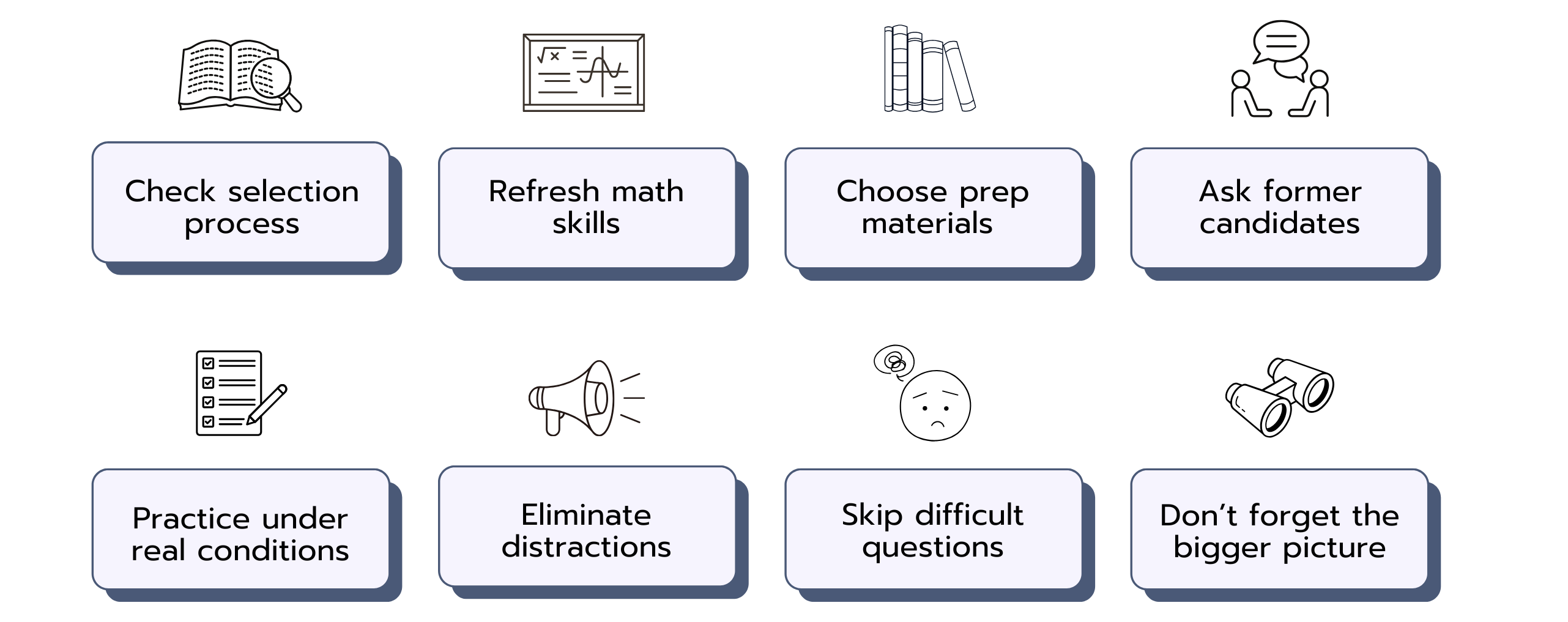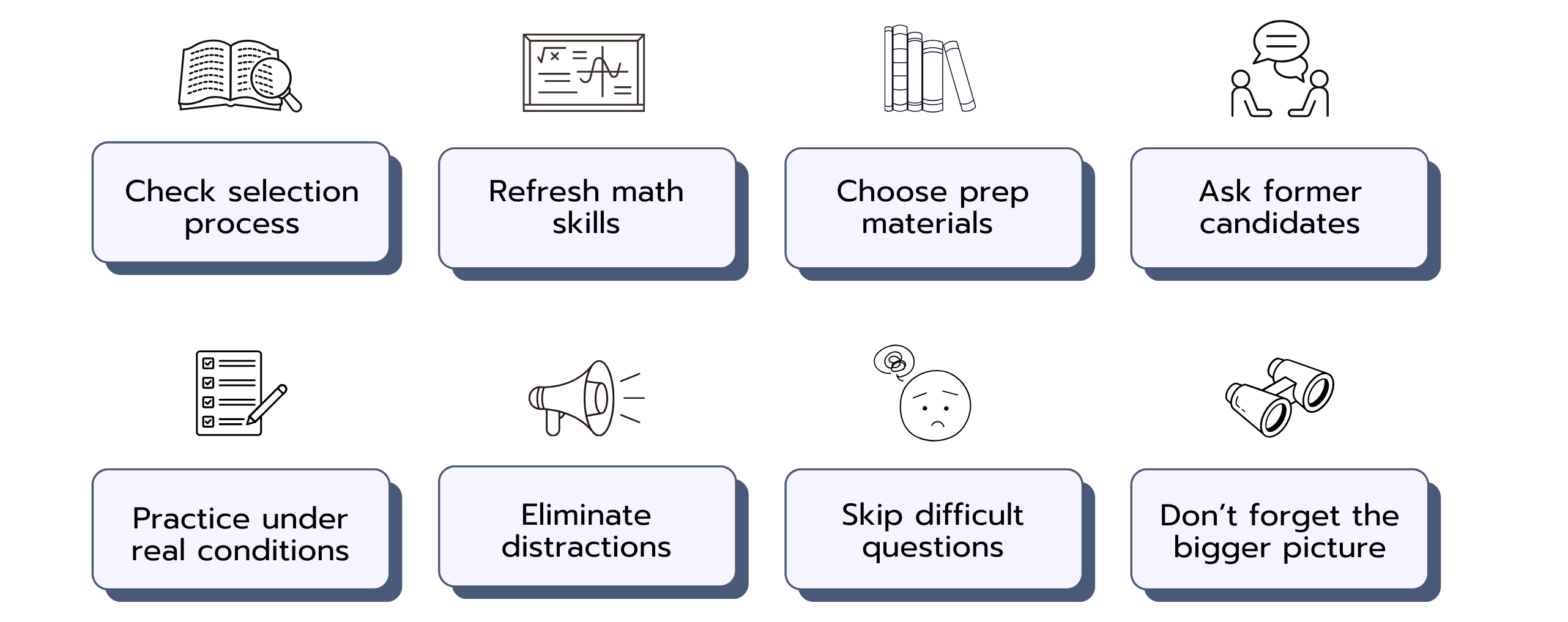Many consulting firms include an online test as part of their hiring process. Oliver Wyman is no exception, using the Numerical Reasoning Test to assess candidates. Compared to other tests, this one is particularly challenging and is considered one of the toughest in consulting. But don’t worry! With our tips and the right preparation, you'll breeze through the Numerical Reasoning Test.


8 Tips to Crush the Oliver Wyman Numerical Reasoning Test
How is the Test Structured and Why Is It So Challenging?
While tests at other consulting firms like BCG and McKinsey cover multiple dimensions, such as data analysis, the focus of the Oliver Wyman Numerical Reasoning Test is mainly on mathematical problems, similar to the GMAT.
The test typically lasts for 20 minutes and consists of up to 30 multiple-choice questions. That means you have less than a minute to answer each question.
What makes the test particularly challenging are the penalties for incorrect answers. Oliver Wyman deducts points for each wrong answer. So, unlike McKinsey’s PST, you can’t just guess. But there are also advantages: You’re allowed to use a calculator, and since the test is taken online from home, you can also switch between questions. Still, you should not underestimate the test – the right preparation is crucial!
What Questions Are Included in the Oliver Wyman Numerical Reasoning Test?
The questions might look something like this:
- A pen costs €0.60. In a deal, you get 12 pens for the price of 10. How much does each pen cost now?
- A company reports 8 years of consistent revenue growth. The revenue is now twice as high as it was 8 years ago. What is the CAGR?
- What is the least common multiple of 8, 9, 10, 11, 12, and 24?
- You have 10 apples, 2 of which are bad. If you select 4 apples, what is the probability that at least one bad apple is among them?
- What is the probability that it will rain on two consecutive days within 5 days if the daily chance of rain is 50%?
How Many Points Do I Need to Achieve?
There is no officially known minimum score, but typically, you’ll fail the test if you score less than 50% of the total points. This may not sound too difficult at first glance, but keep in mind: Each incorrect answer deducts a point!
8 Tips for the Oliver Wyman Numerical Reasoning Test


Tip 1: Find Out if the Numerical Reasoning Test Is Part of Your Selection Process.
Depending on the location you are applying to, you may not need to take the Numerical Reasoning Test at Oliver Wyman. Before investing valuable time that could be spent preparing for your case interviews, check with your local HR contact to confirm whether the Numerical Reasoning Test is part of your selection process. If it is, then it's time to start preparing – this test is pretty tough!
Tip 2: Refresh Your Math Skills.
It’s likely been a while since your last math exam, so you should review the following topics that might appear in the Oliver Wyman Numerical Reasoning Test:
- Algebra
- Ratios
- Percentages
- Geometry
- Probability
- Permutation
- Combinatorics
Make sure you're comfortable with key formulas, such as those for diameter, volume, or area of geometric shapes. A formula sheet can be helpful, but you should be able to find and apply formulas quickly. While you can use a calculator, practicing mental math will be useful, especially since you won’t be allowed a calculator in the case interviews. The sooner you start practicing, the better!
Tip 3: Choose Your Preparation Materials Carefully.
Oliver Wyman does not provide official sample questions for the Numerical Reasoning Test. Therefore, we recommend practicing with GMAT-style questions. These resemble the types of questions on the Numerical Reasoning Test and can be found for free online. Additionally, there’s little specific preparation material for the Oliver Wyman math test (at least in Europe).
Tip 4: Ask Former Candidates for Advice.
Do you know anyone who has already gone through the Oliver Wyman application process? Ask them if they remember any specific test questions! Even if they don’t remember the exact questions, they can give you an idea of what the test is like and what to watch out for. This will help you prepare more efficiently by learning from others’ experiences. If you don’t know anyone, use online forums like our Consulting Q&A, where you can find candidates and experts with Oliver Wyman experience who can assist you!
Tip 5: Practice the Numerical Reasoning Test Under Real Exam Conditions.
When you begin with a practice test, simulate real exam conditions: set a timer for 20 minutes and try to answer as many questions as possible. Spend no more than one minute per question, and only look at the solution steps once you've completed the test. This way, you can calculate your total score and see which questions give you trouble. Focus on these areas and do more exercises on those topics. If you have weaker areas, don’t stress too much. Over time, you’ll get familiar with the different question types and know which ones to skip.
Tip 6: Eliminate Distractions.
Find a location where you feel comfortable and won’t be disturbed for the test! The library may seem quiet, but you could be distracted. Your home is probably a better choice. If you live in a shared apartment, ask your roommates not to disturb you for 20 minutes. Turn off your smartphone and any social media notifications. Full concentration is required!
Also, check if your internet connection is stable. Slow loading times can cost you valuable time – and it would be frustrating to fail because of this!
Tip 7: Skip Difficult Questions.
It’s nearly impossible to complete the entire test in the short time available. So don’t try to solve every single question! Work through the test and skip questions you don’t know the answer to right away. If you have time left at the end, try to answer them.
Since this test penalizes for wrong answers, only guess if you’re sure you can eliminate at least one option.
Tip 8: Don’t Forget the Bigger Picture.
The Oliver Wyman Numerical Reasoning Test is one of the most challenging selection tests. But it makes up just a small part of the entire application process. Of course, you should prepare well, but the personal fit and case interview rounds are far more decisive for your offer. Plan your preparation time wisely and don’t spend too much time on the online test.
PrepLounge: Your Key to Success
As a PrepLounge user, you get access to everything you need to land an offer at Oliver Wyman. We’ll support you from your application to contract negotiations. Without proper preparation, your chances of success will decrease. Invest in your future now and prepare for your case interview in the best way possible. Share your experiences in the Consulting Q&A with other applicants and get insider tips from ex-consultants. Take the first step – join our case interview community and lay the foundation for your consulting career!
Continue to Learn





